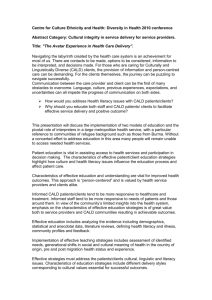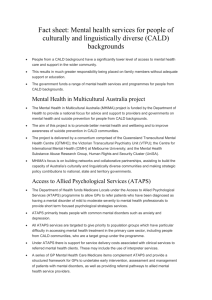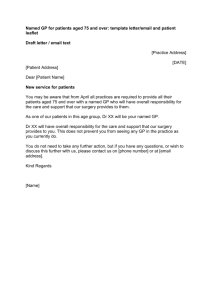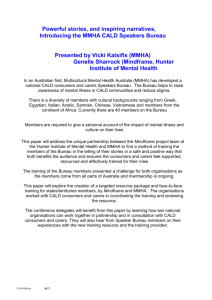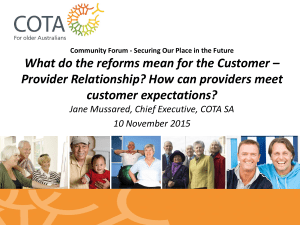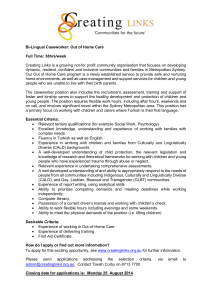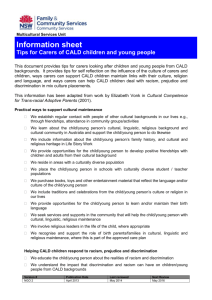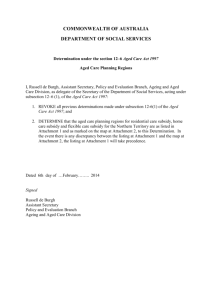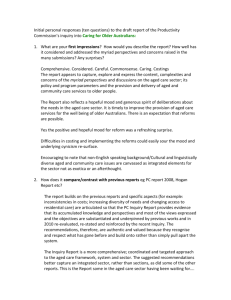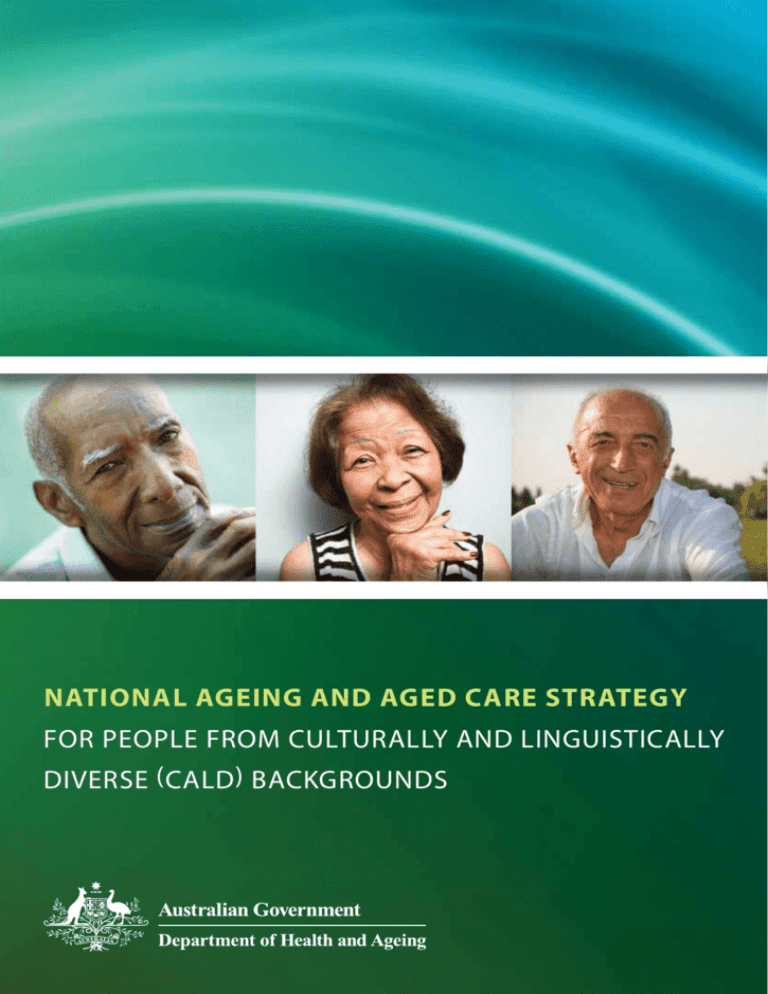
NATIONAL AGEING AND AGED CARE STRATEGY
FOR PEOPLE FROM CULTURALLY AND LINGUISTICALLY
DIVERSE ( CALD ) BACKGROUNDS
National Ageing and Aged Care Strategy for People from
Culturally and Linguistically Diverse (CALD) Backgrounds
ISBN: 978-1-74241-859-9
Online ISBN: 978-1-74241-860-5
Publications approval number: D0982
© Commonwealth of Australia 2012
This work is copyright. You may reproduce the whole or part of this work in unaltered form for your own personal
use or, if you are part of an organisation, for internal use within your organisation, but only if you or your organisation
do not use the reproduction for any commercial purpose and retain this copyright notice and all disclaimer notices
as part of that reproduction. Apart from rights to use as permitted by the Copyright Act 1968 or allowed by this
copyright notice, all other rights are reserved and you are not allowed to reproduce the whole or any part of
this work in any way (electronic or otherwise) without first being given the specific written permission from the
Commonwealth to do so. Requests and inquiries concerning reproduction and rights are to be sent to the Online,
Services and External Relations Branch, Department of Health and Ageing, GPO Box 9848, Canberra ACT 2601, or via
e-mail to copyright@health.gov.au.
CONTENTS
Ministerial Foreword
3
Diverse Australia
4
Current approaches to catering for cultural and linguistic diversity
6
Culturally and linguistically appropriate care
7
Annual Reporting
8
Principles8
Strategic Goals and Actions
12
GOAL 1 – CALD input positively affects the development of ageing and aged care
policies and programs that are appropriate and responsive
GOAL 2 – Achieve a level of knowledge, systems capacity and confidence for older
people from CALD backgrounds, their families and carers to exercise informed choice
in aged care
GOAL 3 – Older people from CALD backgrounds are able and have the confidence to
access and use the full range of ageing and aged care services
GOAL 4 – Monitor and evaluate the delivery of ageing and aged care services to ensure
that they meet the care needs of older people from CALD backgrounds, their families
and carers
15
GOAL 5 – Enhance the CALD sector’s capacity to provide ageing and aged care services
16
GOAL 6 – Achieve better practice through improving research and data collection
mechanisms that are inclusive of cultural and linguistic diversity in the ageing population
12
13
14
17
Appendices18
Acronyms and Terms
18
Relevant Policy and Legislative Frameworks
20
Further Reading
21
1
2
NATIONAL AGEING AND AGED CARE STRATEGY FOR PEOPLE FROM CULTURALLY AND LINGUISTICALLY DIVERSE (CALD) BACKGROUNDS
MINISTERIAL FOREWORD
I greatly welcome the opportunity to present the Government’s new National Ageing and Aged Care Strategy for People
from Culturally and Linguistically Diverse (CALD) Backgrounds (the Strategy).
The Australian Government is committed to ensuring equitable access to high quality, culturally appropriate aged
care for people from CALD backgrounds. A range of initiatives have been put in place that recognise:
•
a large proportion of older people in Australia were born overseas and the proportion of older people from CALD
backgrounds is increasing at a faster rate than other older people;
•
changing immigration patterns in Australia will lead to changing consumer cohorts, which will impact on service
delivery and require forward planning; and
•
barriers to accessible, culturally appropriate aged care still exist in Australia.
The Strategy is designed to inform the way the Australian Government supports the aged care sector to deliver care
that is appropriate and sensitive to the needs of older people from CALD backgrounds. The Strategy will assist the
Department of Health and Ageing (DoHA) in implementing the activities outlined in the Living Longer Living Better
aged care reform package and assist in guiding future funding priorities.
It is essential for aged care services to support the lives of older people from CALD backgrounds, their families
and carers to continue to contribute to and engage with their communities. Aged care must accommodate the
community life of older people from CALD backgrounds, not the other way around.
The Strategy complements Australia’s multicultural policy, The People of Australia, released in 2011.
The Federation of Ethnic Communities’ Councils of Australia is to be commended for their significant contribution to
this Strategy and I thank them for their time and commitment.
I look forward to the implementation of this Strategy and its initiatives which will benefit people from CALD
backgrounds well into the future.
Mark Butler MP
3
DIVERSE AUSTRALIA
Australia is one of the most culturally diverse nations in the world.
People from CALD backgrounds are a significant and growing
proportion of the Australian population aged over 65. They have
made important contributions to the Australian community in
helping build the prosperous and culturally rich country that we
live in today. Around 20 per cent of people aged over 65 years
were born outside Australia which equates to more than
600,000 people. By 2021, more than 30 per cent of Australia’s older
population will have been born outside Australia.
While 14 per cent of Australians are aged over 65, this proportion
varies significantly among a number of CALD communities due to
migration patterns. For example, of those people in Australia who
were born in Latvia, Lithuania, Estonia or Slovenia, more than 60
per cent are aged 65 years and over. Conversely, of those living in
Australia who were born in South Korea, Taiwan or Afghanistan,
less than five per cent are aged 65 years and over.
It is important to recognise that older Australians from CALD
backgrounds are not a uniform group. The diversity within
Australia’s CALD community is significant. Australians identify
with more than 300 ancestries and there are more than 260
different languages spoken in Australia today, including
Indigenous languages.
4
By 2021, more than
30 per cent of Australia’s
older population will have
been born outside Australia.
NATIONAL AGEING AND AGED CARE STRATEGY FOR PEOPLE FROM CULTURALLY AND LINGUISTICALLY DIVERSE (CALD) BACKGROUNDS
The needs of different CALD communities and individuals within those communities vary considerably. These distinct
needs must be recognised and catered for in the aged care system to ensure that it has the capacity to respond to the
individual person regardless of their cultural or linguistic background. All individuals are cultural beings embedded
within the cultural and linguistic paradigms of their families, social groups, community, education and experiences.
It is also important to recognise the valuable role performed by carers in providing care and support for older people
from CALD backgrounds. CALD carers can experience greater difficulty in accessing and navigating the aged care
system - many CALD carers are ‘hidden’ carers who are more likely to experience barriers related to differences in
language and culture. Cultural resistance to formal aged care services in many CALD communities means that many
older people from CALD backgrounds are themselves a carer for a family member and many CALD carers face cultural
and other barriers in accessing carer support services.
All individuals are cultural
beings embedded within
the cultural and linguistic
paradigms of their families,
social groups, community,
education and experiences.
As with any group of people, older people from CALD backgrounds have multiple diverse characteristics that overlap
and alter their specific needs and how they access services. This ‘diversity within diversity’ includes (but is not limited
to) care leavers, being lesbian, gay, bisexual, transgender or intersex, people living with dementia, those in palliative
care, suffering financial disadvantage and issues associated with living in rural and regional areas. All of the issues
discussed in this Strategy tend to be exacerbated for diverse groups and this can result in very different experiences
which need to be considered when providing aged care services.
Also important is the consideration of the needs of older people with refugee or refugee-like experiences, as well as
veterans from CALD backgrounds which will require the consideration of their mental health in the development and
delivery of appropriate aged care.
5
Current Approaches to Catering for
Cultural and Linguistic Diversity
The Aged Care Act 1997 and its associated principles define a
number of Special Needs groups that are taken into account
in planning and delivering aged care services. People from
non-English speaking backgrounds (CALD backgrounds) are
designated as one of these groups.
Older people from CALD backgrounds can access and benefit
from the same funding and services as other older people
in the community. There are also some additional initiatives
intended to address their Special Needs.
The Australian Government funds an organisation in
each state and territory to equip aged care providers to
deliver culturally appropriate care to older people from
CALD backgrounds. These organisations provide culturally
appropriate training to staff of aged care services, disseminate
information on high quality aged care practices and support
aged care service providers to develop new culturally
appropriate services including clusters, ethno-specific and
multicultural aged care services.
Funding is also provided to the organisations to assist older
people from CALD communities to gain access to aged care
information and services. Some of the activities undertaken
by the organisations include translations, referrals and
information sessions for CALD communities.
Additionally, the Australian Government provides financial
support to government funded residential aged care
services to access interpreting services. The Department of
Immigration and Citizenship’s Translating and Interpreting
Services (TIS National) provides this service. TIS National is
available 24 hours a day, seven days a week and provides both
telephone and onsite interpreting.
6
NATIONAL AGEING AND AGED CARE STRATEGY FOR PEOPLE FROM CULTURALLY AND LINGUISTICALLY DIVERSE (CALD) BACKGROUNDS
Culturally and Linguistically
Appropriate Care
The term ‘culturally and linguistically appropriate’ is an umbrella
term used to refer to a range of concepts, including:
•
cultural and linguistic responsiveness;
•
cultural and linguistic inclusiveness; and
•
cultural and linguistic sensitivity.
In this Strategy, culturally and linguistically appropriate care
is targeted care which is reflective of and responsive to
the cultural, linguistic and spiritual needs of the person. It
uses cultural and linguistic characteristics, experiences and
perspectives of ethnically diverse people to deliver aged care
services more effectively.
‘Diversity within diversity’
needs to be considered when
providing aged care services.
7
The principles are also
designed to assist
the aged care sector
in considering CALD
appropriate practice
within their own
organisations.
ANNUAL REPORTING
The Department of Health and Ageing (DoHA) will implement the strategic
goals of this Strategy and report progress against this Strategy annually. Progress
towards the achievement of individual strategic goals will occur over more than
one reporting period. The report will be made publicly available and reviewed
by key stakeholders in the context of a consultation process to set priorities for
subsequent reporting periods. DoHA will publicise the release of annual reports
and the existence of this Strategy.
There will be a formal review of the Strategy which will feed into the broader
review of the Living Longer Living Better aged care reform implementation to be
undertaken in 2017.
PRINCIPLES
There are a number of policies being implemented simultaneously as a result of
the Living Longer Living Better aged care reform package that will affect the lives
of older people from CALD backgrounds, their families and carers. To enable all
DoHA related ageing and aged care activities to be appropriate to the needs
of older people from CALD backgrounds, the following principles have been
developed to provide a framework for CALD inclusion in all activities and in the
provision of aged care services, as well as the specific strategic goals and actions
of this Strategy. The principles are also designed to assist the aged care sector in
considering CALD appropriate practice within their own organisations.
These principles are written in present tense to promote the expectation of
embedding them into practice immediately or as soon as practicable.
8
NATIONAL AGEING AND AGED CARE STRATEGY FOR PEOPLE FROM CULTURALLY AND LINGUISTICALLY DIVERSE (CALD) BACKGROUNDS
INCLUSION – The needs of older people from CALD backgrounds,
their families and carers are included in the development of
Australian Government ageing and aged care policies and
programs on an ongoing basis
•
Ageing and aged care policy and program development is designed, analysed and
implemented to be equitable, inclusive of and appropriate to the needs of older
people from CALD backgrounds, their families and carers. Priority areas include
palliative care needs, dementia and mental and chronic health issues.
•
Older people from CALD backgrounds, their families and carers are involved in the
development, implementation and evaluation of ageing and aged care programs
and services through participatory consultative structures.
EMPOWERMENT – Older people from CALD backgrounds, their
families and carers are supported and have the knowledge and
confidence to maximise their use of the aged care system
•
Older people from CALD backgrounds, their families and carers have the
information, knowledge and access to language services to engage with the
aged care sector and relevant agencies, including government, as informed and
supported consumers and self-advocates.
•
Older people from CALD backgrounds, their families and carers have the
knowledge, capacity and support to exercise informed choice of aged care
services and service providers.
•
Older people from CALD backgrounds have human rights respected and are free
from elder abuse.
9
ACCESS AND EQUITY – All areas of ageing and aged care
understand the importance of and deliver culturally and
linguistically responsive care
•
All ageing and aged care services have the responsibility to provide
culturally, linguistically and spiritually appropriate and flexible aged care
(across generalist, multicultural and ethno-specific service types) to
facilitate maximum choice for CALD aged care recipients.
•
Ageing and aged care specific information is delivered through
communication strategies that are clear, easily accessible and relevant to
older people from CALD backgrounds, their families and carers.
•
Care should be provided using a consumer directed approach. It is
important to have an appropriate understanding of each individual’s
background, culture, beliefs and needs.
•
All healthy ageing policy initiatives consider and address the needs of
older people from CALD backgrounds, their families and carers.
•
Language and support services are available and utilised to enable older
people from CALD backgrounds, their families and carers to access all
components of the aged care system.
•
Ensure the diverse sub groups within CALD communities (including
regional, rural, remote, small communities, emerging CALD ageing
communities, care leavers and seniors with low levels of health literacy)
are considered in the design of aged care services so as to meet their
needs.
•
All aged care complaints and feedback mechanisms are culturally and
linguistically appropriate.
QUALITY – Care and support services are appropriate to
the needs of older people from CALD backgrounds, their
families and carers and are assessed accordingly
•
10
Service and service standards meet the cultural and linguistic needs
of older people from CALD backgrounds, their families and carers and
embody consumer directed care principles.
NATIONAL AGEING AND AGED CARE STRATEGY FOR PEOPLE FROM CULTURALLY AND LINGUISTICALLY DIVERSE (CALD) BACKGROUNDS
It is important
that the aged care
system is responsive
to the particular
circumstances of
people from CALD
backgrounds.
•
Aged care service providers have the structural capacity and resources to
develop organisational competency to support culturally and linguistically
appropriate care. This includes the development of aged care worker
and volunteer skills and knowledge that enable appropriate consumer
directed care to older people from CALD backgrounds.
•
Research and translation of research into better practice is encouraged
to support development of appropriate policies and programs for older
people from CALD backgrounds, their families and carers.
CAPACITY BUILDING – Individuals from CALD backgrounds
and CALD communities have the capacity to both articulate
their ageing and aged care needs and be involved in the
development of services and the workforce to meet these
needs
•
CALD community capacity is understood and factored into approaches
to support older people from CALD backgrounds accessing aged care
services.
•
CALD community capacity is strengthened to assist in supporting the
wider aged care service base to better meet the needs of older people
from CALD backgrounds.
•
CALD community capacity is strengthened to develop a workforce with
the skills and knowledge to deliver culturally, linguistically and
faith-appropriate aged care services.
•
Partnerships between government, aged care providers and CALD
organisations are fostered to build the capacity of CALD people to access
all services across the aged care continuum.
•
Older people from CALD backgrounds have the capacity to engage with
and participate in the delivery of ageing and aged care services, including
through volunteering.
11
STRATEGIC GOALS AND ACTIONS
The Strategic goals and actions are the tangible outcomes that DoHA will achieve from 2012-2017.
GOAL 1 – CALD input positively affects the
development of ageing and aged care policies and
programs that are appropriate and responsive
ACTION AREAS
DoHA will:
12
1.1
Establish and use existing CALD consultative mechanisms on an ongoing basis to engage on the breadth of
aged care issues, as well as on enabling mechanisms such as communication strategies.
1.2
Include and support CALD sector advocates in ageing and aged care program development and review
consultative mechanisms, including discussions regarding implementation of the Living Longer Living Better
aged care reform package.
1.3
Develop initiatives in dementia assessment/early diagnosis services, acute care, respite care and palliative
care that are inclusive of and responsive to the needs of older people from CALD backgrounds.
1.4
Increase awareness and understanding of Advance Care Planning among people from CALD backgrounds.
1.5
Inform the Aged Care Reform Implementation Council on this Strategy to help ensure alignment with the
implementation of aged care reform activities.
NATIONAL AGEING AND AGED CARE STRATEGY FOR PEOPLE FROM CULTURALLY AND LINGUISTICALLY DIVERSE (CALD) BACKGROUNDS
GOAL 2 – Achieve a level of knowledge, systems
capacity and confidence for older people from CALD
backgrounds, their families and carers to exercise
informed choice in aged care
ACTION AREAS
DoHA will:
2.1 Develop, deliver and promote appropriate multilingual
information and education through a whole of
department CALD communication framework in order
to raise awareness of the full range of aged care and
support services and facilitate informed choice of
services.
2.2 Review on an ongoing basis the National Aged Care
Advocacy Program (NACAP) to include an emphasis on
promoting, supporting and maximising access to
advocacy for older people from CALD backgrounds,
their families and carers.
2.3 Support aged care providers to take into account
cultural, linguistic and spiritual diversity and needs
when involving family members, carers and personal
advocates in decision-making in consumer directed
care environments.
2.4 Continue to develop, support and resource innovative
programs and projects addressing the goals of this
Strategy and identified emerging issues, currently
through the Aged Care Service Improvement and
Healthy Ageing Grants Fund and any new
funding programs.
2.5 Acknowledge and resource the role of ethno-specific
and multicultural services in developing the capacity
of people from CALD backgrounds to access the aged
care system.
13
GOAL 3 – Older people from CALD
backgrounds are able and have the
confidence to access and use the full
range of ageing and aged care services
ACTION AREAS
DoHA will:
3.1 Ensure that the Aged Care Gateway delivers culturally and linguistically
appropriate services. This includes through language services and various
communication mediums. Where limitations exist, consideration will be
given to alternate measures to achieve access.
3.2 Address the barriers that can reduce the capacity of older people from CALD
backgrounds, their families and carers to access aged care services and to
receive appropriate care, in specific planning and allocation processes.
3.3
Make grants available from 2013-14 to expand the Community Visitors
Scheme (CVS) to specifically include older people from CALD backgrounds,
to minimise social isolation of people receiving aged care.
3.4 Develop and implement options to improve and expand the coverage of
translation and interpreting services throughout the aged care system.
3.5 Promote the availability of language services, to CALD communities and
recipients of aged care.
3.6
14
Promote carer specific information to aged care services, CALD communities,
carers and recipients of aged care to generate a greater awareness and
understanding of the roles of carers as partners in care and continue services
that support carers of older people from CALD backgrounds.
NATIONAL AGEING AND AGED CARE STRATEGY FOR PEOPLE FROM CULTURALLY AND LINGUISTICALLY DIVERSE (CALD) BACKGROUNDS
GOAL 4 – Monitor and evaluate the delivery of
ageing and aged care services to ensure that they
meet the care needs of older people from CALD
backgrounds, their families and carers
ACTION AREAS
DoHA will:
4.1 Recognise members of all Special Needs groups, including people from CALD backgrounds, within
the Quality of Care Principles 1997 which encompasses the Accreditation Standards, Community Care
Common Standards and Flexible Care Standards and support the aged care sector in understanding
how older people from CALD backgrounds fit within these accreditation frameworks.
4.2 In the development of aged care quality indicators, specific mechanisms will be developed to be
reflective of appropriate care for CALD clients.
4.3 Support and monitor the development and implementation of dementia services to help ensure that
they are particularly responsive to cultural values and understandings.
4.4 Work with organisations funded to improve the interface between the health and aged care sectors to
address specific barriers encountered by CALD communities in receiving seamless care services.
4.5 Ensure that the Aged Care Complaints Scheme is promoted to CALD communities and accessible by
older people from CALD backgrounds, their families and carers, including through the use of bilingual
workers, interpreting and translating services.
4.6 Work with the CALD sector, including consumers and service providers, to develop and provide
cultural competency training for promotion and incorporation into all aged care services.
4.7
Work with other government departments and agencies to develop appropriate education and
training to enhance CALD aged care workforce skills.
15
GOAL 5 – Enhance the CALD sector’s capacity
to provide ageing and aged care services
ACTION AREAS
DoHA will:
5.1 Expand options to enhance the capacity of existing and emerging CALD communities
as potential aged care service providers, and to develop services across the aged care
continuum inclusive of dementia and respite care.
5.2 Develop targeted communications to address any existing ‘stigma’ in CALD
communities that inhibits aged care service access and use.
5.3 Support the implementation of this Strategy by promoting awareness of the Strategy
and its annual reporting.
5.4 In partnership with the CALD sector, develop targeted communications to encourage
members of CALD communities to consider employment, volunteering and training in
the aged care sector.
16
5.5
Develop structured pathways to facilitate the employment of appropriate bilingual
staff in the aged care system.
5.6
Develop relevant service models and partnerships that facilitate the involvement of
CALD communities in delivering aged care.
NATIONAL AGEING AND AGED CARE STRATEGY FOR PEOPLE FROM CULTURALLY AND LINGUISTICALLY DIVERSE (CALD) BACKGROUNDS
GOAL 6 – Achieve better practice through
improving research and data collection mechanisms
that are inclusive of cultural and linguistic diversity
in the ageing population
ACTION AREAS
DoHA will:
6.1
Work with ageing research bodies to help ensure CALD communities are represented, at least
in proportion to the size of their community, in all representative studies and surveys of older
population and aged care and that this diversity is reflected in reach analysis.
6.2
Develop, in collaboration with research organisations, a program of research to inform equitable,
quality, effective, inclusive and accessible aged care services to CALD communities.
6.3
Work with the Australian Institute of Health and Welfare (AIHW) to establish the Aged Care Data
Clearing House, including access to information about CALD clients, practical resources, operations/
procedures manuals, case studies, research materials, problem solving workflows, organisational
change work plans and health promotion packages. Included in this would be an active role to
monitor services gaps for CALD clients and identify priority interventions.
6.4 Work with research bodies to help ensure that the diversity of the Australian population is
represented in all elements of health and medical research.
6.5
Work with the Australian Bureau of Statistics (ABS) to:
(a) Develop standards for ensuring relevant data collections include appropriate
representation of older CALD groups.
(b) Ensure coding and publication of data from relevant data collections is provided for older
CALD communities.
(c) Develop and make freely available a compendium of available data sources relevant to
older CALD populations, and CALD aged-specific datasets, to support the implementation
of this Strategy.
(d) Include CALD indicators within the Australian Census, Survey of Disability, Ageing and
Carers (SDAC).
6.6 Utilise personal stories, data, advice and research obtained in collaboration with the
CALD community to inform the development/improvement of responsive aged care
planning and service delivery.
17
APPENDICES
Acronyms and Terms
ACAT
Aged Care Assessment Team
Aged Care Encompasses Australian Government funded programs providing personal
care and/or nursing services, including Home Care (community care), the
Home and Community Care Program, respite care, residential care and from
July 2015, the Home Support program.
Aged Care Gateway The identifiable entry point for the aged care system to enable
timely and reliable information to be accessed by older people, their
families and carers.
CALD Culturally and Linguistically Diverse
CALD Stakeholder Any person or agency who has an interest in culturally and linguistically
diverse individuals or communities. They may be service providers,
consumers, carers, researchers and citizens.
Carer
People who provide personal care, support and assistance to people with
disability, medical conditions (including terminal or chronic illness), mental
illness or frailty due to age (as per the Carer Recognition Act 2010). Carers
include family members, friends, relatives, siblings or neighbours.
Care Leaver
For the purpose of the Strategy, a care leaver is an adult who spent time
in care as a child (i.e. under the age of 18). This care would have been
approved by the state through a court order or on a voluntary basis. Such
care could be in foster care, residential care (mainly children’s homes) or
other arrangements outside the immediate or extended family. The care
could have been provided directly by the state or by the voluntary or
private sector. The term ‘care leaver’ includes Forgotten Australians, Former
Child Migrants and Stolen Generations.
Community Care
Care consisting of a package of personal care services and other personal
assistance provided to a person who is not being provided with residential
care (as per s.45-3 of the Aged Care Act 1997).
Consumer Directed Care (CDC) For the purpose of this Strategy, CDC empowers the person to have
more control over their own lives. It focuses on the person’s life goals and
strengths, placing their needs at the centre of the services and support
(including aged care and health services). The person makes choices and/
or manages the services they access, to the extent they are able and wish
to do so, including who will deliver the services and when. Where there is a
carer their needs are also acknowledged and considered. CDC incorporates
many of the principles of Person Centred Care, while putting the consumer
in charge of decisions about their care.
18
NATIONAL AGEING AND AGED CARE STRATEGY FOR PEOPLE FROM CULTURALLY AND LINGUISTICALLY DIVERSE (CALD) BACKGROUNDS
EACH Extended Aged Care at Home
Ethno-specific
Service category based on ethnic, linguistic or religious community
providing a service to its own members.
FECCA
Federation of Ethnic Communities’ Councils of Australia
Generalist
Service category without a designated demographic. An alternative to
‘mainstream’ provider.
HACC Home and Community Care
Home Care From 1 July 2013, two new types of Home Care package (Level 1 and 3)
will be established to complement the existing CACPs (Level 2 packages)
and EACH packages (Level 4 packages) – providing a continuum of home
care options covering basic home care support all the way through to
complex home care.
Home Support
On 1 July 2015, the HACC program, the National Respite for Carers Program,
Day Therapy Centres and the Assistance with Care and Housing for the Aged
Program will be consolidated under a new Home Support program. The
Home Support program will have a focus on prevention and reablement as
the first level of care in an end-to-end aged care system.
Multicultural Services Service category based on provision of services to a range of ethnic,
linguistic or religious communities.
Peak organisation An association of industries or groups generally established for the purposes
of developing standards and processes, or to act on behalf of all members
when lobbying government or promoting the interests of the members.
PICAC
Partners in Culturally Appropriate Care
Residential Care Personal care and/or nursing care, that is provided to a person in a
residential facility in which the person is also provided with accommodation
that includes appropriate staffing to meet the nursing and personal care
needs of the person; and meals and cleaning services; and furnishings,
furniture and equipment (as per s.41-3 of the Aged Care Act 1997).
Special Needs group
The term “people with special needs” is defined in section 11-3 of the Act
and sections 4.4B to 4.4E of the Allocation Principles 1997 made under the Act.
There are eight groups of people with special needs, people from Aboriginal
and Torres Strait Islander communities; people from non-English speaking
(culturally and linguistically diverse) backgrounds; people who live in rural or
remote areas; people who are financially or socially disadvantaged; people
who are veterans, (of the Australian Defence Force or an allied defence force),
including the spouse, widow or widower of a veteran; people who are
homeless or at risk of becoming homeless; people who are care leavers; and
people from the Lesbian, Gay, Bisexual, Transgender and Intersex community.
19
Relevant Policy and Legislative
Frameworks
20
•
Living Longer Living Better aged care reform package
•
Quality of Care Principles 1997
•
The People of Australia – Australia’s Multicultural Policy
•
Charter of Public Service in a Multicultural Society, Department of Immigration and
Multicultural Affairs, 1998
•
The National Framework for Action on Dementia
•
National Palliative Care Strategy
•
National Carer Strategy 2011
•
The Statement for Australia’s Carers (s. 2.2 of Carer Recognition Act 2010)
•
National Lesbian, Gay, Bisexual, Transgender and Intersex (LGBTI) Ageing and Aged Care
Strategy
•
Access and Equity for a multicultural Australia – inquiry into the responsiveness of
Australian Government services to Australia’s culturally and linguistically diverse
population
•
An Investment Not an Expense: Enhancing Health Literacy in Culturally and Linguistically
Diverse Communities, Ethnic Communities Council of Victoria August 2012
•
The Universal Declaration of Human Rights
•
Respect and Choice – A Human Rights Approach for Ageing and Health
•
State and Territory ageing and aged care strategies
•
National Mental Health Strategy 2012
•
Cultural competency in health: a guide for policy, partnerships and participation, National
Health and Medical Research Council 2006
NATIONAL AGEING AND AGED CARE STRATEGY FOR PEOPLE FROM CULTURALLY AND LINGUISTICALLY DIVERSE (CALD) BACKGROUNDS
Further Reading
•
ABS Census Data, 2011 http://www.abs.gov.au/websitedbs/censushome.nsf/
homecensus?opendocument&navpos=10
•
Alzheimer’s Australia Victoria, 2008, Perceptions of dementia in ethnic
communities.
•
Australian Government Productivity Commission, 2011, Caring for Older
Australians, vol. 2.
•
Centre for Cultural Diversity in Ageing website, available at
http://www.culturaldiversity.com.au/
•
Dutch Care, 2010, Caring for Older Australians: Aged People from a
Non-English Speaking Background.
•
Ethnic Communities’ Council of Victoria, 2010, Caring for Older Australians in
Ethnic Communities – ECCV Submission to the Productivity Commission Inquiry:
Caring for Older Australians.
•
Ethnic Link Services UnitingCare Wesley Port Adelaide, 2010, Submission to
Productivity Commission: Inquiry into Caring for Older Australians.
•
Federation of Ethnic Communities’ Councils of Australia, 2011, Caring for
Older Australians: A CALD Perspective.
•
Gibson et al. 2001 in the Australian Government Productivity Commission,
Caring for Older Australians 2011, vol. 1.
•
Parliamentary Paper 100/2009 in Ethnic Communities’ Council of Victoria,
2010, Caring for Older Australians in Ethnic Communities – ECCV Submission to
the Productivity Commission Inquiry: Caring for Older Australians.
•
Runci, S., 2003, Older persons from culturally and linguistically diverse
backgrounds in residential care. Doctoral dissertation, Monash University,
Victoria.
•
Wall. S, Santalucia. Y, Salem. M, Giacomin. D, McDonald. R and Bosnjak. F,
2011. Enhancing the Lives of Older Refugees, NSW Refugee Health Service.
21
All information in this publication is correct as at November 2012.
D0982 / November / 2012
www.health.gov.au/caldstrategy

